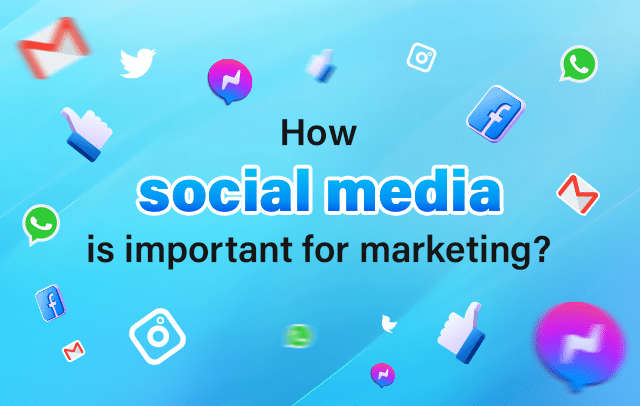
Enhancing Customer Engagement through Social Media Marketing
What are the 5 ways of social media marketing?
In the modern era of technology, social media has completely
transformed how businesses establish connections with their
target audience and promote their products or services. Social media platforms
have become powerful marketing tools that allow companies to reach a wide range
of potential customers, engage with their target audience, and build brand
awareness. In this article, we will explore the concept of social media in
marketing, its benefits, and how businesses can effectively leverage its
potential to achieve their marketing goals.
There are several effective ways to engage in social media
marketing. Here are five commonly used strategies:
Content Creation and Sharing: Create valuable and engaging content, such as blog posts, articles, videos, infographics, and images, to share on your social media platforms. The goal is to provide valuable information and entertainment to your audience, while also promoting your brand or products.
Influencer Marketing: Collaborate with influencers or popular individuals in your industry who have a large following on social media. These influencers can help promote your brand, products, or services to their audience, increasing your reach and credibility.
Social Media Advertising: Utilize paid advertising on social media platforms to target specific demographics, interests, and behaviors. Platforms like Facebook, Instagram, Twitter, and LinkedIn offer powerful advertising tools to reach your target audience and drive traffic to your website or landing pages.
Community Engagement: Actively engage with your audience on social media by responding to comments, messages, and mentions. Encourage discussions, ask questions, and run contests or giveaways to foster a sense of community and build stronger relationships with your followers.
Analytics and Optimization: Use social media analytics tools to track the performance of your campaigns and identify areas for improvement. Analyze metrics such as engagement rate, reach, clicks, and conversions to understand what content resonates best with your audience. Based on these insights, optimize your strategy and refine your social media marketing efforts.
Remember, social media marketing is an ongoing process that requires consistency, creativity, and adaptability. It's important to stay updated on the latest trends, platforms, and techniques to effectively leverage the power of social media for your business.
What are the types of social media marketing?
There are several types of social media marketing that businesses can utilize to reach their target audience and achieve their marketing goals. Here are some common types:
Organic Social Media Marketing: This involves creating and sharing content on social media platforms without relying on paid advertising. It includes posting regular updates, engaging with followers, and building a community around your brand.
Paid Social Media Advertising: This type of marketing involves running paid advertising campaigns on social media platforms. Businesses can use targeting options to reach specific demographics, interests, or behaviors. Examples include sponsored posts, display ads, and promoted videos.
Influencer Marketing: Influencer marketing involves collaborating with influencers or individuals who have a large following on social media. Businesses can partner with influencers to promote their products or services to their audience, leveraging their influence and credibility.
Social Media Contests and Giveaways: Running contests and giveaways on social media is an effective way to engage with your audience and generate excitement around your brand. This type of marketing encourages user participation, increases brand awareness, and can help grow your social media following.
Social Media Influencer Takeovers: This involves giving an influencer temporary control of your social media accounts to create and share content. It allows the influencer to connect with your audience directly and showcase your brand in a more personal and authentic way.
Social Listening and Engagement: This type of marketing involves actively monitoring social media platforms for mentions, comments, and conversations related to your brand. By listening to your audience, you can engage in meaningful conversations, address customer concerns, and gather valuable feedback.
Social Media Analytics and Insights: Utilizing social media analytics tools allows businesses to track and measure the performance of their social media marketing efforts. By analyzing metrics such as engagement, reach, and conversions, you can gain insights into what content resonates best with your audience and make data-driven decisions.
These are just a few examples of the types of social media marketing available. It's important to choose the strategies that align with your business goals, target audience, and resources, and to adapt your approach based on the ever-evolving nature of social media platforms.

How social media is important for marketing?
Social media has become increasingly important for marketing due to its wide-reaching impact and ability to connect businesses with their target audience. Below are several crucial reasons highlighting the importance of social media for marketing:
Increased Brand Awareness: Social media platforms provide businesses with an opportunity to increase their brand visibility and reach a larger audience. By creating engaging content and actively participating in social media conversations, businesses can raise awareness about their brand, products, and services.
Social media platforms provide advanced targeting capabilities, enabling businesses to reach precise demographics, interests, and behaviors through targeted advertising. This enables businesses to deliver their marketing messages to the right people at the right time, maximizing the effectiveness of their campaigns.
Enhanced Customer Engagement: Social media provides a platform for direct interaction and engagement with customers. Businesses can respond to comments, messages, and mentions in real-time, creating a more personal and interactive relationship with their audience. This engagement helps build trust, loyalty, and customer satisfaction.
Relationship Building and Community Building: Social media allows businesses to build relationships and foster a sense of community around their brand. By sharing valuable content, responding to customer feedback, and initiating conversations, businesses can create a loyal and engaged following. This can lead to long-term customer relationships and advocacy.
Content Distribution and Promotion: Social media provides businesses with a cost-effective way to distribute and promote their content. By sharing blog posts, articles, videos, and other valuable content, businesses can drive traffic to their website, generate leads, and increase conversions.
Real-time Market Insights: Social media platforms offer valuable insights into customer behavior, preferences, and trends. By monitoring social media conversations and analyzing engagement metrics, businesses can gain a deeper understanding of their target audience. This information can inform marketing strategies, product development, and customer service initiatives.
In the current digital landscape, maintaining a robust social media presence is essential to maintain a competitive edge. By effectively utilizing social media marketing, businesses can differentiate themselves from competitors, establish themselves as industry leaders, and stay top of mind with their target audience.
Social media has transformed the marketing landscape by providing businesses with powerful tools to connect with their audience, build brand awareness, and drive business growth. It offers numerous opportunities for businesses to engage, communicate, and build relationships with their customers dynamically and interactively.
.png)
Does Social Media Marketing make good Money?
Social media marketing has the potential to generate a significant return on investment (ROI) and can be a lucrative avenue for businesses. However, the amount of money made through social media marketing varies depending on various factors, such as the business's industry, target audience, marketing strategies, and the effectiveness of their campaigns.
When implemented strategically and effectively, social media marketing can lead to increased brand awareness, customer engagement, website traffic, lead generation, and conversions. These outcomes can ultimately translate into higher sales and revenue for businesses.
It's important to note that social media marketing success is not solely determined by monetary gains but also by the achievement of marketing goals and the establishment of a strong online presence. The profitability of social media marketing efforts can be influenced by factors such as the business's size, resources, and ability to adapt to changing trends and algorithms on social media platforms. Additionally, the competitive landscape also plays a role in determining the financial outcomes of social media marketing strategies.
Ultimately, businesses should carefully plan and execute their social media marketing strategies, monitor their performance, and continuously optimize their efforts to maximize their chances of generating a positive financial impact.
Is Media Marketing a skill?
Yes, social media marketing is considered a skill. It involves various aspects such as creating engaging content, understanding target audiences, implementing marketing strategies, utilizing social media platforms effectively, analyzing data and insights, and staying updated with the latest trends and best practices in the field. Mastering these skills requires knowledge, experience, and continuous learning to effectively promote and grow a business through social media channels.
.png)
How much does cost Media Marketing?
The cost of social media marketing can vary greatly depending on several factors. These factors include the size and scope of the marketing campaign, the goals and objectives, the platforms used, the target audience, and the level of expertise required.
In general, businesses can have different budgetary requirements for social media marketing, ranging from small investments to more substantial budgets. Some businesses may choose to handle their social media marketing in-house, which involves the cost of hiring and training staff, acquiring necessary tools and software, and dedicating time and resources.
For businesses that prefer to outsource their social media marketing, the cost will depend on the services provided by the agency or consultant. Social media marketing services can include content creation, advertising, community management, analytics, and strategy development. The pricing models can vary, such as flat monthly fees, hourly rates, or project-based fees.
It's important to note that the cost of social media marketing should be seen as an investment rather than a fixed expense. The return on investment (ROI) and the overall effectiveness of the marketing efforts should be considered when determining the budget for social media marketing. It's advisable for businesses to carefully evaluate their goals, resources, and expected outcomes to establish an appropriate budget for their social media marketing endeavors.
.png)
What is for C's in marketing?
In the field of marketing, there are several commonly referenced "C's" that represent important principles or elements. Here are four of the well-known "C's" in marketing:
Customer: The customer is the central focus of marketing. Understanding their needs, preferences, and behaviors is crucial for developing effective marketing strategies and delivering value to them.
Content: Content refers to the creation and dissemination of relevant, valuable, and engaging material to attract and retain customers. This can include various forms of content such as blog posts, videos, social media posts, and articles.
Communication: Effective communication is vital in marketing to convey messages, build relationships, and engage with customers. It involves clear and persuasive messaging through various channels to reach and connect with the target audience.
Conversion: Conversion refers to the process of turning potential customers into actual customers. It involves guiding and persuading individuals to take the desired action, such as making a purchase, subscribing to a service, or filling out a form.
These four "C's" provide a framework for understanding and implementing successful marketing strategies by focusing on the customer, creating compelling content, effective communication, and achieving conversions.
What are the 4C's & 6C's of marketing?
The 4C's and 6C's are two different marketing frameworks that provide valuable perspectives on various elements of marketing. Here's a breakdown of each:
4C's of Marketing:
Customer: Focus on understanding and meeting the needs of the customer by providing value and building strong relationships.
Cost: Consider the overall cost to the customer, including not only the monetary price but also the effort, time, and any other associated costs.
Convenience: Provide convenience to the customer by making the buying process easy, accessible, and efficient.
Communication: Establish effective communication channels to engage and interact with customers, allowing them to provide feedback and address their concerns.
6C's of Marketing:
Customer: Understanding and catering to the needs and preferences of the target customers.
Company: Analyzing and leveraging the strengths, resources, and capabilities of the company to create value for customers.
Competitors: Assessing the competitive landscape, identifying competitors, and developing strategies to differentiate and outperform them.
Collaborators: Identifying potential partners, suppliers, and distributors to collaborate and create mutually beneficial relationships.
Context: Considering the broader market environment, including economic, social, cultural, and technological factors that can impact marketing strategies.
Culture: Recognizing and respecting cultural differences and adapting marketing approaches to align with cultural norms and values.
These frameworks offer different perspectives on marketing, emphasizing the importance of customer-centricity, cost, convenience, and communication (in the 4C's) and expanding to include the company's capabilities, competition, collaboration, context, and culture (in the 6C's). Both frameworks provide valuable insights to guide effective marketing strategies and decision-making processes.
What social media is best for marketing?
The choice of social media platforms for marketing depends on various factors such as your target audience, marketing objectives, and the nature of your business. Here are some popular social media platforms commonly used for marketing:
Facebook provides an extensive reach and diverse audience targeting options, boasting over 2.8 billion monthly active users. It's suitable for businesses targeting a wide range of demographics and industries.
Instagram: Known for its visual content, Instagram is ideal for businesses focused on visual storytelling, lifestyle, fashion, beauty, travel, and food industries. It has a younger user base, particularly popular among millennials and Gen Z.
Twitter: Twitter is suitable for real-time updates, news, and engaging in conversations with a large user base. It can be effective for businesses in industries such as news, technology, entertainment, and customer service.
LinkedIn: LinkedIn is a professional networking platform primarily used for B2B marketing and targeting professionals and businesses. It is valuable for lead generation, recruitment, thought leadership, and industry-specific content.
YouTube: As a video-centric platform, YouTube is ideal for businesses that can leverage video content effectively. It is suitable for various industries, including entertainment, education, product demonstrations, tutorials, and influencer marketing.
Pinterest: It is known for its visual discovery and inspiration. It is popular in industries like fashion, home decor, DIY, food, and travel. Businesses can showcase their products, curate content, and drive traffic to their websites.
It's important to conduct market research, understand your target audience's preferences and behaviors, and align your marketing goals with the features and strengths of each platform. Consider using a combination of platforms based on your business objectives and the platforms where your target audience is most active. Regularly monitor and analyze your results to optimize your social media marketing strategy accordingly.











